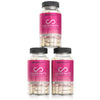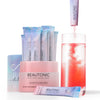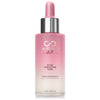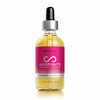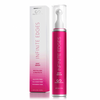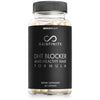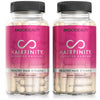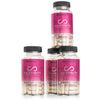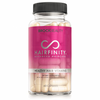
How to Keep Your Hair Healthy with Hard Water
Hard water is often characterized by the presence of a high amount of minerals. It is formed when pure rainwater passes through limestone deposits, gypsum, and chalk. These substances that the water passes through contain a high quantity of sulfates, bicarbonates, calcium, and magnesium carbonates.
The benefits of drinking hard water aren't much. In industries, the use of hard water is controlled to the barest minimum to avoid the breakdown of cooling towers, boilers, and other expensive equipment.
In domestic settings, hard water is often recognized by the lack of foam formation when soap is mixed with the water. It causes limescale to build up on water heaters, sinks, bathtubs, and faucets. This water also leaves mineral deposits on our dishes, cups, and glassware and can cause fading when used in washing clothes.
Did you know that the water you're using to bathe and wash your hair impacts your skin and hair? The minerals in hard water don't bind with soaps, shampoos, and conditioners, thus reducing their effectiveness and increasing the amount used in washing.
Continuously washing your hair with hard water can lead to the minerals present in it creating a film on your scalp which eventually prevents moisture from entering your hair. This results in dandruff, itchiness, and faded, dry, dull, and tangled hair.
Using hard water to wash your hair will cause a film to build up, preventing moisture from entering; this will leave your hair dry and prone to breakage. Leaving these issues unresolved may lead to hair loss.
Now, what's hard water doing to your hair? Damage, of course! Don't worry, we 've got you covered! This article will discuss all you need to know about how hard water affects your hair, how to prevent it, how to use hard water for washing your hair, and also how to soften hard water.
Let's begin!
How Does Hard Water Affect Hair?
Hard water itself is not harmful, but it has adverse effects on our skin and hair.
Research carried out on 15 females has shown hard water can damage hair. This was proved after washing hair samples for 30 days in distilled water and hard water.
At the end of the research, women whose hair had been washed with hard water had a tangled appearance and decreased thickness.
If you're washing your hair with hard water, you will likely experience frizziness, breakage, tangles, thinning, craziness, dry scalp, and dullness.
These minor issues can turn into more severe problems if left untreated. They can affect the growth of healthy hair leading to hair loss and hair thinning.
Hard water also makes coloring your hair harder; this causes unnecessary stress to your hairstylist. The mineral deposits of hard water left on your scalp and hair can make it difficult for your hair to get colored. So if you're the type that likes coloring your hair, consider using hard water on it as a no-go area.
Experts have proved that hard water severely affects the scalp causing hair loss, especially in people suffering from psoriasis and eczema.
How to Fix Hard Water Hair Damage
Using hard water to wash your hair will damage it and leave it looking coarse, dull, crunchy, patched, dried, and tangled. You'll also notice a yuk-feeling on your scalp caused by the build-up of minerals and heavy residues due to washing hair with hard water.
These residues create a layer of unseen deposits that repel moisturizers and nutrients.
The sad truth is, the more your hair is washed with hard water, the harder it will be to treat it back to normal, as hair styling products don't work on stiff water-damaged hair except if it has been fixed.
We won't let hard water suffocate your hair follicles and give you heavy flat hair that looks frazzled and dried. Use the tips below to clean your hair from the built-up layers and regain its shiny and polished look.
- Get a Water Softener
This might not be the cheapest option, but it will save you a lot of money in the long run. Don't forget that hard water affects your hair, skin, and house appliances.
These appliances get clogged with hard water and may stop working and cost you money to replace. Utilizing a water softener will curb this.
Soft water is the opposite of hard water. It also contains nutrients and minerals but has low concentration, making it safer, cleaner, and healthier to use. Installing a water softener in a home can be costly; a good alternative is establishing a water softener shower head.
These showerheads can remove the minerals in hard water before touching the hair and skin. This will not only prevent your hair from damage but also prevent your skin from acne and eczema.
- Deep Cleanse your Hair at least Once a Week
Also known as deep cleansing shampoo, a clarifying shampoo removes stubborn build-up from daily hair products like shampoos, gels, conditioners, waxes, hair sprays, and hard water deposits. HAIRFINITY Gentle Cleanse Shampoo is a clarifying shampoo that rids your hair of impurities without stripping your hair of its natural moisture.
The best technique to treat hard water damage is to remove mineral build-up. Using a clarifying shampoo that concentrates on hard water build-up removal rather than just any hair products is a great method to achieve this.
Making clarifying shampoo an essential ingredient in your weekly hair care regimen is vital, whether or not you have hard water damage. It effectively cleanses the deep roots.
- Try a Vinegar Rinse
As said earlier, to fight hard water damage, you need to start from the root.
Vinegar can be used in fixing hair damage as it contains vitamins needed by the hair and also lowers the pH of the hair. It is also an antimicrobial.
Here's a simple DIY recipe for a vinegar rinse:
- Get a ¼ cup of an Apple cider vinegar
- Mix it with one cup of water
- Add a few drops of lavender oil or coconut oil to scent
- Spray the rinse on your hair after washing and massage your scalp thoroughly
- Leave it for 20 minutes, then rinse with clean water.
This neutralizes the effects of hard water on your hair and also fights fungal infections. The acidity of the vinegar removes hard water minerals build up by balancing the hair pH to give you soft and glossy hair.
- Try a Citric Acid Rinse
Another effective treatment for hard water hair damage is a citric acid rinse.
Citric acid is present in lemon and lime juice, and it neutralizes the effects of mineral build-up on hair. Here's a simple DIY recipe for a citric acid rinse:
- Squeeze some lemon or lime into a cup
- Dilute the juice with clean water
- Wet your hair with the rinse before washing it with shampoo
- Apply shampoo after some minutes and wash your scalp thoroughly
- Rinse with clean water
The citric acid rinse will remove minerals build up and make your hair glossy, but it also has antiseptic properties that prevent dandruff.
However, it's advisable to avoid using citric acid rinse frequently as it can lighten your hair over time.
- Use a Hair Mask
A hair mask can effectively restore the moisture and sleekness of your hair. Hard water causes high porosity that can't be undone by using shampoos.
Using an excellent hair mask can help to heal damaged strands. It will provide your hair with the keratin it requires while also improving the outside layers. Give your hair a deeper infusion of moisture with HAIRFINITY Strenghtening Hair Masque, infused with relaxing scents of sea salt, hibiscus and essential oils
Massage the mask gently but firmly into your hair and leave it 25 minutes, and wait to see how your hair will change from a coarse and rugged texture to a soft and silky one.
- Make a Baking Soda Hair Wash
Sounds queer, right? A baking soda hair wash cleanses your hair thoroughly from residues and build-ups. Unlike shampoos, this hair wash will not remove your natural hair oils and moisturizers.
There are different baking soda hair wash recipes for other hairs; you can check online or talk to your hairstylist. But believe me, it's a super effective treatment for those experiencing hard water hair damage.
How to Wash Your Hair With Hard Water
Are you in a position where you have no option other than to wash your hair with hard water? Don't worry; you can still prevent the damage by using these hair washing tricks.
- Please focus on the scalp when washing your hair; use your fingertips to massage it wholly
- Use a clarifying shampoo or a sulfate-free one; this removes dirt and excess oil from the hair.
- Rinse your hair from the crown forward to the forehead; that's the natural direction of hair growth.
- Rinse the hair thoroughly before applying conditioner
- End your shower with cold water to close your cuticles
These tips will reduce the effects of hard water on your hair to the barest minimum.
Hard Water and Gray Hair: What's the Myth?
A common myth among people is that hard water can cause gray hair. This is incorrect; hard water only hastens the discoloration of dyed hair.
Hard water contains minerals such as magnesium, calcium, and other elements that cause hair to fade and dull faster. Water with iron serves as an oxidant, giving dark hair copper-red colors and light-colored hair highlighted tones. You expose your colored hair to too early deterioration the more you wash it with harsh water.
Does Hard Water Cause Hair Loss?
A combination of the various nutrients and minerals found in hard water tends to react with your shampoo to form a salt that leaves a residue on your scalp and hair.
This will decrease hair moisture and elasticity, making your hair more prone to breakage. Untreated hair breakage can lead to hair thinning and hair loss in the long run.
Excess mineral build-up makes your hair feel tangled, heavier, and flat and makes the strands brittle and dry. It can also clog your hair roots and affect new hair growth deposits, also causing dandruff and itchiness.
In short, hard water can lead to conditions that cause hair loss and hair thinning.
How to Soften Hard Water For Your Hair Washing
Softening hard water is a good option for those that don't have easy access to soft water. Many methods are used for softening hard water that fit different settings ranging from laundry, industrial use, and domestic use. There are many easy ways to soften hard water using essential household items. Below are the two best ways to soften hard water for hair washing.
- Boil the Water
The simplest and one of the most effective methods of softening hard water is by boiling it. When you boil hard water, most of its salts precipitate, leaving cleaner and healthier water.
Boil some water for roughly five minutes on a heater or on a stove. Allow the water to reheat after turning off the stove.
The majority of mineral deposits will accumulate in the bottom of the pot or heater. Collect the water in a clean container and use it to wash your hair.
- Use an Ion Filter Exchanger
Do you want something that works like magic? An ion filter exchanger is one! It's straightforward to use and comes at a budget-friendly price.
It softens hard water by removing magnesium and calcium ions and replacing them with soluble ions.
An added advantage of this appliance is its portable size. It's very compact so that you can attach it to your faucet. It will soften water as it flows from the faucet. There are also ion-exchange filters for pitchers.
Get an ion exchange filter and restore the glow and silky texture of your stiff water-damaged hair.
Conclusion
Fixing hard water hair damage starts from the source, which is the water. It's also important to know how hard your water is and how to soften it.
Hard water isn't harmful, but it gives your hair a dry and frazzled look and can even lead to minor hair loss if used for a long time. Neutralize the effects of the vital minerals in hard water to bring back your hair to its shiny, soft, and silky nature, and your hair will be glad you did!
















